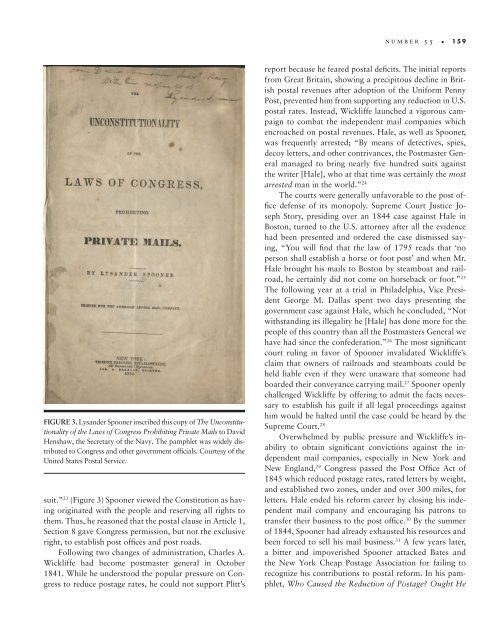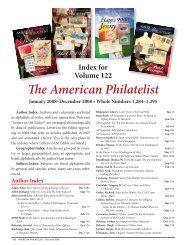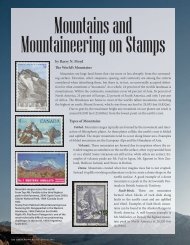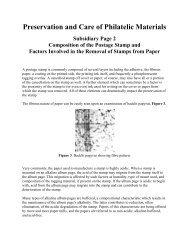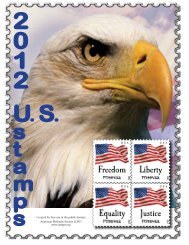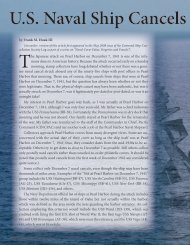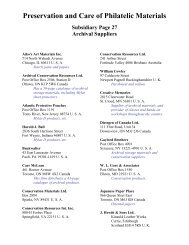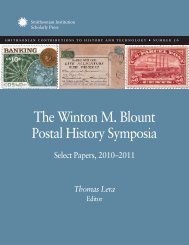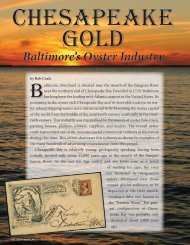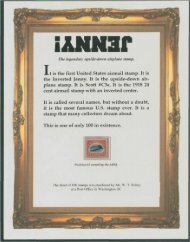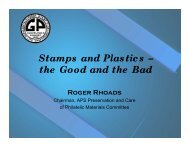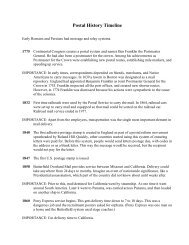The Winton M. Blount Postal History Symposia - Smithsonian ...
The Winton M. Blount Postal History Symposia - Smithsonian ...
The Winton M. Blount Postal History Symposia - Smithsonian ...
- No tags were found...
Create successful ePaper yourself
Turn your PDF publications into a flip-book with our unique Google optimized e-Paper software.
n u m b e r 5 5 • 1 5 9Figure 3. Lysander Spooner inscribed this copy of <strong>The</strong> Unconstitutionalityof the Laws of Congress Prohibiting Private Mails to DavidHenshaw, the Secretary of the Navy. <strong>The</strong> pamphlet was widely distributedto Congress and other government officials. Courtesy of theUnited States <strong>Postal</strong> Service.suit.” 23 (Figure 3) Spooner viewed the Constitution as havingoriginated with the people and reserving all rights tothem. Thus, he reasoned that the postal clause in Article 1,Section 8 gave Congress permission, but not the exclusiveright, to establish post offices and post roads.Following two changes of administration, Charles A.Wickliffe had become postmaster general in October1841. While he understood the popular pressure on Congressto reduce postage rates, he could not support Plitt’sreport because he feared postal deficits. <strong>The</strong> initial reportsfrom Great Britain, showing a precipitous decline in Britishpostal revenues after adoption of the Uniform PennyPost, prevented him from supporting any reduction in U.S.postal rates. Instead, Wickliffe launched a vigorous campaignto combat the independent mail companies whichencroached on postal revenues. Hale, as well as Spooner,was frequently arrested; “By means of detectives, spies,decoy letters, and other contrivances, the Postmaster Generalmanaged to bring nearly five hundred suits againstthe writer [Hale], who at that time was certainly the mostarrested man in the world.” 24<strong>The</strong> courts were generally unfavorable to the post officedefense of its monopoly. Supreme Court Justice JosephStory, presiding over an 1844 case against Hale inBoston, turned to the U.S. attorney after all the evidencehad been presented and ordered the case dismissed saying,“You will find that the law of 1795 reads that ‘noperson shall establish a horse or foot post’ and when Mr.Hale brought his mails to Boston by steamboat and railroad,he certainly did not come on horseback or foot.” 25<strong>The</strong> following year at a trial in Philadelphia, Vice PresidentGeorge M. Dallas spent two days presenting thegovernment case against Hale, which he concluded, “Notwithstanding its illegality he [Hale] has done more for thepeople of this country than all the Postmasters General wehave had since the confederation.” 26 <strong>The</strong> most significantcourt ruling in favor of Spooner invalidated Wickliffe’sclaim that owners of railroads and steamboats could beheld liable even if they were unaware that someone hadboarded their conveyance carrying mail. 27 Spooner openlychallenged Wickliffe by offering to admit the facts necessaryto establish his guilt if all legal proceedings againsthim would be halted until the case could be heard by theSupreme Court. 28Overwhelmed by public pressure and Wickliffe’s inabilityto obtain significant convictions against the independentmail companies, especially in New York andNew England, 29 Congress passed the Post Office Act of1845 which reduced postage rates, rated letters by weight,and established two zones, under and over 300 miles, forletters. Hale ended his reform career by closing his independentmail company and encouraging his patrons totransfer their business to the post office. 30 By the summerof 1844, Spooner had already exhausted his resources andbeen forced to sell his mail business. 31 A few years later,a bitter and impoverished Spooner attacked Bates andthe New York Cheap Postage Association for failing torecognize his contributions to postal reform. In his pamphlet,Who Caused the Reduction of Postage? Ought He


